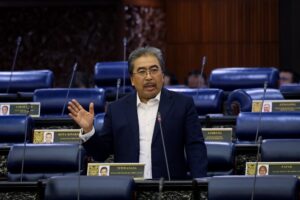KUALA LUMPUR, Nov 13 — The government will establish an Online Safety Committee as the highest monitoring body to address issues related to online safety, said Minister in the Prime Minister’s Department (Law and Institutional Reform) Datuk Seri Azalina Othman Said.
She said Section 5 of the Online Safety Act 2025 (Act 866) provides for the formation of a committee to advise and make recommendations to the Malaysian Communications and Multimedia Commission (MCMC), the regulatory agency responsible for online safety.
Azalina said the first protem meeting, which she will chair, will be held soon to set strategic priorities, coordinate the implementation direction, and ensure the committee functions as an effective platform for online safety policy coordination.
“Under Section 10 of this Act, the committee will advise and make recommendations covering the identification of harmful content and the prioritisation of such content.
“It will also determine methods for analysing and mitigating risks to users exposed to harmful content, conduct research related to harmful content, and promote best practices to ensure service providers are accountable,” she said during a ministerial briefing on the committee in the Special Chambers of the Dewan Rakyat today.
Azalina said the committee is crucial given that there are 33.1 million active social media users in Malaysia, representing 96 per cent of the population, including about 10.6 million users aged under 18.
She said that the committee will serve as a channel for ongoing cooperation and consultations between the government and social media platform providers such as Meta, Google, TikTok, and X, ensuring that safety measures, content moderation and child protection are implemented effectively.
Although Act 866 falls under the purview of the Communications Minister, Azalina noted that the Act provides for a separate, neutral committee tasked with advising on online safety matters.
The Act was gazetted on May 22 and is expected to come into force on Jan 1 next year as MCMC finalises 10 subsidiary legislations under Section 81 of the Act.
Commenting on the Criminal Law Reform Committee (CLRC), Azalina said the committee focuses on reviewing and recommending comprehensive reforms to Malaysia’s main criminal law statutes, including the Evidence Act 1950, Penal Code and Criminal Procedure Code.
“CLRC is also reviewing proposals to introduce new provisions under the Penal Code criminalising misuse of artificial intelligence (AI) technologies, including synthetic intimate image creation, digital impersonation, and automated grooming.
“These proposals will clarify responsibilities and liabilities not only for individuals creating or distributing content but also for those assisting or encouraging such acts,” she said, adding that CLRC’s mandate includes balancing freedom of speech with protection, cross-border issues, and security concerns. — Bernama




